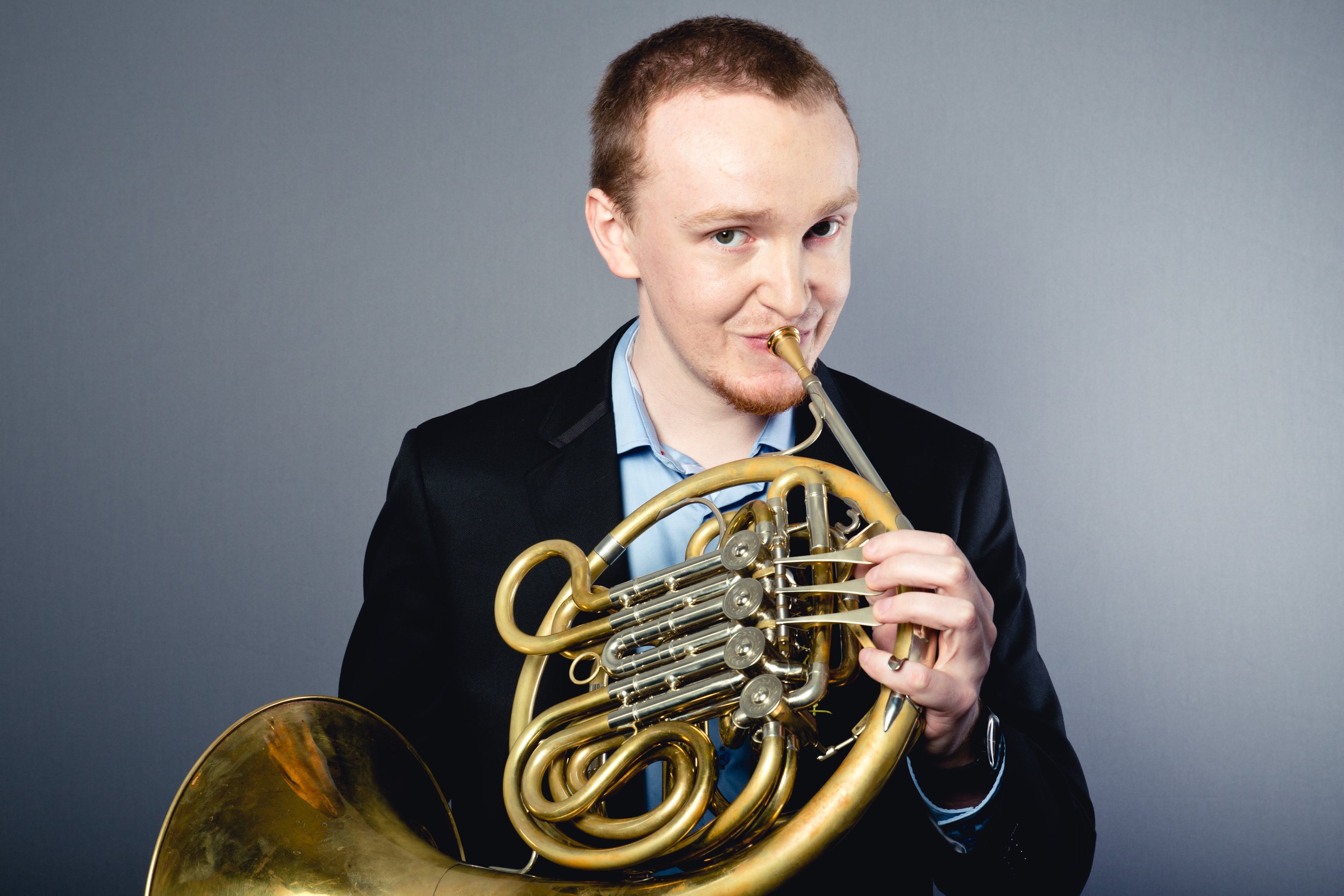Musician's words: how can you combine your musical practice with your professional life?
A horn player from an early age, Julien Deneuville has never stopped playing his instrument. A passionate musician, he continues to play in top-level orchestras while maintaining a professional and leisure life. Moves and the constraints of daily life have not prevented Julien from maintaining his dedication to music. Discover his tips for continuing to play music, alone or in an orchestra.
How long have you been playing the French horn?
I started playing the French horn at the age of 7, and have continued without any real interruption since. Despite a very busy career, and other equally time-consuming hobbies, I've always managed to maintain a good level of instrumental practice, and to play in good amateur orchestras. As I've moved house, for example, one of my first concerns has always been to find an orchestra that can accommodate me and enable me to continue playing.
Why such tenacity? Above and beyond the pleasure of playing music, for me it's above all a story of encounters: the teachers, conductors and fellow musicians who have marked out my path and pushed me towards the pursuit of excellence, for myself and for others. Today, I find this quest for excellence in my day-to-day work, and I'm convinced that musical practice has contributed to it.
What does music practice mean to you?
Music has provided me with unique, emotionally-charged experiences, such as taking part in orchestral competitions organized by the Confédération Musicale de France (CMF), putting on shows with choir and theater, or taking part in an airshow at the invitation of the French Air Force.
For all these reasons, I've always wanted to continue playing my instrument, and maintain a level of playing that would enable me to play in good amateur orchestras. This is not always easy, and I've had to find ways of organizing myself and training effectively.
My approach may not be very academic, but experience shows that it works pretty well for me, and I hope it can inspire other amateur musicians.
What has most motivated you to continue playing the French horn in recent years?
I would certainly have stopped playing the horn a long time ago if I hadn't had the chance to play in orchestras, in the company of other musicians. It was a turning point in my early years, when solo work and learning music theory seemed tedious. Eventually, I discovered the pleasure of playing with other musicians, and that motivated me to continue, and to progress.
Today, the orchestra or orchestras, whether wind or symphonic, still occupy a central place in my practice. In fact, I distinguish between two types of orchestra: those of which I am a regular member, and those I join on an ad hoc basis. As a horn player, it's not unusual to be asked to help out at a concert, take part in a particular project, or replace an absent musician.
Being a member of a regular orchestra is essential for me. The weekly rehearsal is first and foremost a reunion with other musicians who have become friends. But above all, it's an excellent way of working regularly.
How do you organize your day-to-day rehearsals at tone ?
In general, orchestras are organized around 2 hours of weekly rehearsal. If we can make it, we devote 2 hours exclusively to the music. Of course, it's not 2 hours of actual playing, but even if other sections are involved, it gives you a chance to listen to each other's themes and get a feel for what's going to be essential.
Who's playing, when, what nuance should I adopt, what tempo or gesture has the conductor chosen, what emotion should we convey? I tend to annotate my scores a lot, and I've developed a kind of personal code that enables me to do this more efficiently. For example, a pair of glasses above the staff to indicate that you need to look closely at the conductor.
One-off orchestras are also very important, as they enable us to discover new repertoires, new conductors and new musicians. It's also an opportunity to confront different situations, and to progress. This is the case, for example, when I'm asked to play in a symphony orchestra, whereas I usually play in a wind band. The reference points are different, the sound is different, and you have to know how to adapt. What's more, you don't have much time to prepare for a concert: usually one or two rehearsals, and you have to be efficient.
Rehearsal is also a good way of putting a little pressure on yourself to work outside, because you don't want to look ridiculous in the eyes of the other musicians! It may not be the best source of motivation, but it makes rehearsals much more enjoyable and useful when the musicians already know their score.
Do you have any tips for keeping up your musical practice?
I personally tend to work better when I have a precise objective, and I think this is the case for many people, musicians or not. Like an athlete preparing for a competition, I'll be more motivated to train if I know it's for a planned deadline, however distant. Knowing in advance what's expected of me will help me get organized and ready for the big day.
I write down each rehearsal in my diary to make sure I don't forget it, and try to adapt my appointments so I don't miss it. Of course, it's sometimes difficult to juggle obligations and travel, and I tend to give priority to professional appointments: music remains a hobby. In practice, I miss about half the rehearsals, but I try whenever possible to replace missed rehearsals with individual work.
How much time do you devote to music each week?
I also try to schedule time to work on my instrument, usually at weekends. Between 30 minutes and an hour, once or twice a week, is good enough to maintain a good level. I prefer to divide the work into small, regular sessions that are easier to fit into my schedule. I increase the pace and duration of the sessions as concerts approach.
And, since I'm lucky enough to work from home, I take advantage of this to practice as often as possible. When I need a break during the day, I sometimes take out my horn and play for a few minutes. It takes my mind off things, and allows me to work on the instrument a bit before getting back to work.
Do you have any tips on how to be effective when rehearsing one-on-one at home?
I start by warming up for 5 to 10 minutes to get into condition. I start by laying down sounds to calm down, get the air column going and work on tuning, then intervals and arpeggios to wake up the lips. This routine is fairly limited, but still gets me ready to play afterwards. I also practice it before rehearsals and concerts. And if I have more time, I add a scale or two.
Then I go through my scores, stopping on the difficult lines to work on them in a fairly classical way. Everyone has their own habits, but first I focus on the notes and rythm at a slow tempo, before gradually speeding up. Once I'm comfortable with the passage, I concentrate on the interpretation. Of course, it has to be in line chord with the conductor's expectations, but for me it's essential to know what emotion to convey at each moment in order to make the score my own. This is also what makes the concert more lively and enjoyable for the audience.
In concert, you're used to playing in an orchestra. What are your techniques for rehearsing solo?
I try to read the whole score, not just the themes or solos: certain passages that look easy on paper sometimes turn out to be more complicated than expected, depending on the tempo, or what the other desks are playing at the same time, so I might as well be prepared.
And, if I still have time, I'll dip into my old scores to replay a few themes or work on a concerto, for example. These are often difficult works that make excellent technical work, and prolonging the work session also allows me to improve my physical endurance: the horn puts a lot of strain on the lips and respiratory system, and having strong muscles will make it easier to hold out until the end of a concert without risking too many false notes.
And when you're away on business, how do you go about practicing?
As you will have gathered, my professional activity requires me to travel a lot, and sometimes for quite long periods. Taking my horn with me is out of the question in the vast majority of cases, but I try to find solutions to keep working.
The first solution I found was to pack a mouthpiece. It doesn't take up much room in your luggage, and it allows you to work on the buzz a little to keep your lips supple. It's hard to go any further without an instrument, but it's always worth it. What's more, it can lead to interesting conversations with work colleagues or security guards wondering what this strange object is!
The second solution is to take my sheet music with me. Again, it doesn't really take up much space. Reading sheet music while playing the fingerings in a vacuum is a good exercise when you can't play. When it's possible to find a recording of the work, I also like to read the score while listening to it: this helps to better understand the structure of the work, to know who has the theme at what moment, to practice counting the bars, and to get an idea of the interpretation. Of course, you'll need to adapt the interpretation and tempi to suit the conductor: he's the one who decides!
🎶 Keep your rehearsals on track! With NewzikEnsembleinstantly share scores with your entire ensemble. The Newzik Cloud lets you access an orchestral program at any time, from any device.

